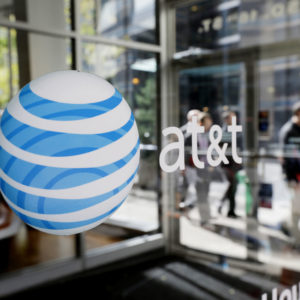AT&T argued in federal court Tuesday the Federal Trade Commission has no authority to police the wireless carrier in a case that could let certain activities by internet providers go unregulated.
The company told judges on the Ninth Circuit Court of Appeals the FTC can’t enforce a 2014 fine leveled against AT&T for throttling unlimited data plan customers without notice because AT&T doesn’t fall under the agency’s jurisdiction anymore. That’s the result of the Federal Communications Commission’s 2015 net neutrality rules reclassifying internet providers as “common carriers,” a public utility designation the FTC can’t regulate.
A smaller panel of judges on the same court agreed with AT&T last year, a ruling that led many to warn it could leave any company acting as an internet provider — like search giant Google with its fiber service — free of regulation over activities like data gathering and privacy policies, which are overseen by the FTC. The agency appealed the case and the full court agreed to re-hear it.
But when AT&T lawyer Michael Kellogg tried to repeat that argument before the full court, judges pressed him on how far AT&T’s regulatory immunity should go. They raised hypothetical situations like if AT&T bought Mercedes or General Motors, would they be free of regulation because of AT&T’s common carrier status, or could Procter & Gamble purchase a company with a common carrier service specifically to avoid FTC enforcement.
“I’m regulated by the FTC and I don’t like it,” Judge Alex Kozinski said. “I go out and I buy a small, money-losing common carrier. Do I say, ‘bye bye FTC,’ under your reading of the statute?”
Kellogg rebutted that in such cases the FCC can compel Procter & Gamble to run its common carrier service under a separate subsidiary, leaving it to be regulated by the FCC while the rest of the company is subjected to FTC oversight.
“The FCC can say, ‘no, these activities you just bought, they’re too far outside the ordinary activities covered under the Communications Act, and you’re going to have to provide those in a separate subsidiary,'” Kellogg told judges.
Joel Marcus — the lawyer arguing the FTC’s case — countered Kellogg’s solution, saying it would depend completely “on the FCC’s willingness to do this,” but acknowledged the FCC does have the power to intervene.
Marcus said the FTC’s interest in the case is data security, and highlighted Verizon’s acquisitions of AOL and Yahoo. Letting the previous ruling stand could potentially make both web giants, boasting data on hundreds of millions of users, immune to data gathering and privacy enforcement by the FTC, since Verizon is a common carrier.
“At this point, the FTC is the only game in town in data security,” Marcus said. “But even beyond that you have the problem of the common carrier who sells dietary supplements or used cars or any of the other things the FTC ordinarily gets involved in.”
Marcus pointed out that wasn’t the case until earlier this year, when congressional Republicans and President Donald Trump repealed data security and privacy rules passed under the Obama administration’s FCC last year. The rules were designed to fill the privacy and data security gap left open by the FTC’s common carrier exemption.
Judges also pointed out the FCC, now led by Republicans, is working on a repeal of the 2015 net neutrality rules, including the reclassification of internet providers as common carriers. If passed, the move would put AT&T, Verizon, and others back under the FTC’s jurisdiction.
The FCC filed its own brief on the case in June, and asked the court to reverse the previous ruling that favored AT&T.
“Now that the court’s prior decision is no longer effective, it will be easier for the FTC to protect consumers’ online privacy,” FCC Chairman Ajit Pai said in May, after the court granted the FTC’s request for an appeal.
Another remedy proposed by the FTC is the removal of the common carrier exemption, a move the Obama administration’s former FTC chief, and now Trump’s, both support.
“It was put in place at a time when common carriers were pervasively regulated monopolies,” Maureen Ohlhausen, the agency’s acting chairwoman, said in January. “Obviously our telecommunications space is vastly different than it was when these rules were put in place.”

